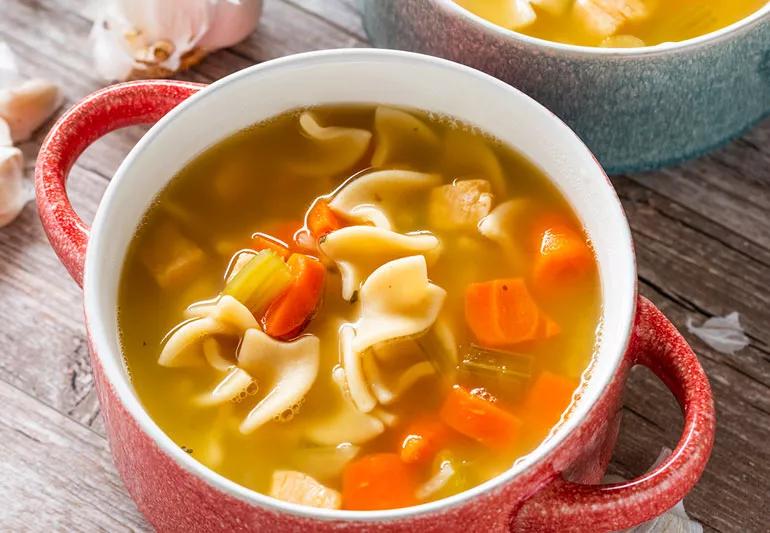From a cold to the flu to sore throats

We all get hit with it. A cold, the flu or just a few days when we’re feeling downright cruddy. Some of us get walloped harder than others, while others seem to avoid sickness the way tweens avoid their parents on social media.
Advertisement
Cleveland Clinic is a non-profit academic medical center. Advertising on our site helps support our mission. We do not endorse non-Cleveland Clinic products or services. Policy
“We cannot necessarily say that food choices can help make a cough disappear or ease a scratchy throat,” says wellness expert Michael Roizen, MD. “But we shouldn’t diminish the fact that it can play a role in how you handle the random sicknesses that can get you from time to time.”
That, of course, is no surprise. You’ve probably heard (and may even subscribe) to the well-known adage, “Feed a cold and starve a fever.” This mama medicine philosophy is pervasive, in part because many people have discovered anecdotally that food can in fact affect how your body prevents and recovers from illnesses like colds and viruses.
But is there actually science that links what you eat with these stay-in-bed-and-moan sicknesses?
Not necessarily. It’s worth noting, Dr. Roizen says, that the meals-as-medicine mantra is somewhat flawed in that a cold is an actual illness and a fever is a symptom.
It’s sort of like comparing apples to oranges — both of which are fine illness fighters.
When you get a cold, you could be suffering from any number of symptoms (cough, congestion, runny nose, loss of appetite, even a fever). A fever itself, though, can be a symptom of any kind of infection that’s causing your immune system to fight whatever bacteria or viruses are invading.
As far as science goes, the data are minimal — and somewhat conflicting.
Advertisement
In one study, for example, different immune-boosting benefits were found for both those who were given a nutrient-rich broth and those who refrained from eating. Another study showed that starvation protected mice infected with bacteria and feeding was detrimental, but that the opposite was true when the mice were infected with a virus. Alas, the research in humans is as sparse as the supermarket water aisle before a hurricane.
So what’s the bottom line? Dr. Roizen says you should let you body — not a mantra — dictate some of your decision-making. Your immune system does need nutrients, so if you’re able to eat (and you feel like eating) you should get some calories in your body.
But if your symptoms are making you nauseated or you don’t have an appetite, you shouldn’t force it down. No matter what, make sure you’re getting plenty of fluids because hydration is the key to bouncing back from an illness. You can easily get dehydrated from sweating and producing lots of mucus, and you need to make plenty of urine to clear the waste from your immune system.
Here, Dr. Roizen explains what foods to load up on and what to avoid:
MVPs to eat: Grandma was right about more than just her philosophy on hugs. She also knew a thing or two about sickness when she pumped you full of chicken soup. Although there aren’t double-blind, placebo-controlled studies looking at the effect of chicken soup on curing a cold, some creative studies have. In one of the most often cited, from decades ago, scientists found that drinking chicken soup helped with nasal mucus velocity (yeah, that’s how fast or not nasal mucus moves).
Other research has found that ingredients in chicken soup have an anti-inflammatory effect (perhaps because of the chicken, broth and vegetables all working together).
Bottom line: Chicken soup will help you stay hydrated, which is important, and may have a soothing effect that can both help speed up your recovery and make you feel better too.
Other starting players: The best part about some of the other foods to prevent sickness is that you can throw them into your soup. Garlic, for example, has been shown to help prevent colds by giving your immune system a kick in the pants. And in one experiment, ginger was shown to block viruses. Finally mushrooms (an ancient medicinal remedy) have been shown to help prime immune cells to better fight an infection.
Cut from the team: Just because oysters have zinc doesn’t mean they help you shorten a cold’s duration. Zinc lozenges do — but extra zinc can cause toxicity, so only take it while you have a cold and not year-round.
This article was adapted from the best-selling book “What to Eat When” by Michael F. Roizen, MD, and Micheal Crupain, MD, MPH with Ted Spiker (©2018 National Geographic Books)
Advertisement
Learn more about our editorial process.
Advertisement

Most recommended precautions center around minimizing bruising or swelling

Even one drink can have an impact on your cognitive function leading to slurred speech, blurred vision and impaired memory

Understand who may (and may not) benefit

Lorem ipsum dolor sit amet. Et odio Quis vel ipsam omnis eum alias deleniti et placeat impedit non voluptas galisum hic autem enim et cupiditate aliquid. Est beatae quidem non facilis autem ut commodi nisi aut tempore rerum et dolores voluptatem cum enim optio id sapiente quasi. Ad laboriosam officiis 33 cupiditate sequi ea voluptatum consectetur qui necessitatibus voluptate et quasi doloremque et facere explicabo quo explicabo officia

Seeking help through therapy can be an important step in improving your quality of life when you have UC

Type 2 diabetes isn’t inevitable with these dietary changes

Applying a hot or cold compress can help with pain